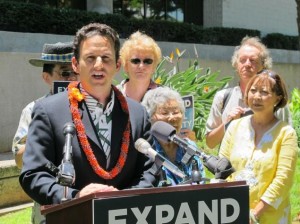While at Netroots Nation a few weeks back, I had the opportunity to listen in on a panel discussing climate change, Texas’ energy future, and energy security featuring Houston Mayor Bill White (you might have also heard he is running for US Senate).
Mayor White gave very measured, political answers. Throughout the panel, never did the words “Cap and Trade” leave his lips, but he did remain skeptical of anyone who claimed to have it all figured out and that their answer would be easy and painless. He also showed legitimate concerns about the impacts of renewable energy mandates done wrong on low-income consumers. As a representative from a consumer advocacy organization, it is refreshing to hear White’s commitment to protecting our most vulnerable even as we chart a new energy future.
Mayor White’s stated goals are to become more energy independent for basic security reasons and to be in control of our energy future. To do so, he maintains that we must reduce our pollution based on sound science, and do so in a way which does not burden low-income households. He proposes three main mechanisms to meet these goals:
- Cut the amount of fuel we use in vehicle travel without impinging on people’s ability to travel freely– specifically by increasing our efficiency per mile traveled.
- Cut the amount of energy consumed in buildings. Why drive up the cost of business by paying for electricity?
- Decrease the amount of power we get from coal and substitute that power with cleaner sources
Despite some skepticism, Mayor White certainly showed that our energy future could have our cake and eat it too, namely through increased efficiency in building codes, fuel efficiency standards for vehicles, and use of cost-effective renewables. See the edited video here:
[vimeo 6300204]
Public Citizen does not and would never endorse candidates. Even if we could, it’s hard to get an exact read on Mayor White and how he would act as the next Senator from Texas on the issue of federal climate policy — so even so we could offer little endorsement other than a candid analysis of his words and his record.
When asked off-camera about how he would vote on the American Clean Energy and Security Act (ACES), the climate bill which passed in the House in June and due up for debate in the Senate over the next 2-3 months, he remained committed to energy efficiency but overall rather vague. White showed skepticism as to large long term goals rather than smaller but gradually increasing cuts in emissions. His version of the bill, he said, would have strong building code mandates, a renewable energy efficiency standard (which is it, Bill?) with a price cap on renewables to protect consumers, and change dispatch priorities to wean the nation off of coal fired power. He did not, however, indicate whether or not he would support implementing a federal cap on carbon dioxide emissions or the cap and trade mechanism.
This is a question likely to come up in the next few months when ACES comes to a Senate vote, and hopefully Mayor White will have a clearer answer prepared when that time comes. But if the final answer is no on ACES, would he have some specific policy solutions about how to improve the bill, or would he just cast the same “no way, never” vote that we’ll likely get from John Cornyn or Kay Bailey Hutchison?
That being said, it is refreshing to hear a candidate speak so fluently about energy policy. Mayor White’s record on energy as Deputy Secretary of Energy stands on its own, as does his impressive work on making Houston a national leader on energy efficiency. We may still be uncertain as to where he stands on ACES, but we certainly know his feelings on energy efficiency both in word and deed – which is nothing to sneeze at.
Read Full Post »

 The Senate is about to hear legislation pertaining to coal ash waste regulation. There is an amendment proposed to slash EPA’s funding so that they cannot enforce safeguards at coal ash waste landfills. The following is a message from our friends with Environmental Integrity Project. Please take a few moments to contact your senator and let them know you want enforcement of regulations on these very hazardous and dangerous waste sites.
The Senate is about to hear legislation pertaining to coal ash waste regulation. There is an amendment proposed to slash EPA’s funding so that they cannot enforce safeguards at coal ash waste landfills. The following is a message from our friends with Environmental Integrity Project. Please take a few moments to contact your senator and let them know you want enforcement of regulations on these very hazardous and dangerous waste sites. The Texas Progressive Alliance is starting to feel an odd craving for can-shaped servings of cranberry sauce as it brings you this week’s highlights from the blogs.
The Texas Progressive Alliance is starting to feel an odd craving for can-shaped servings of cranberry sauce as it brings you this week’s highlights from the blogs.


 Today the House and Senate are working to reconcile their different versions of the long-awaited economic stimulus package. The stakes are now higher than ever for Texans, who stand to gain from billions that could go toward developing renewable energy and efficiency in the state, reducing pollution from diesel engines, and cleaning up abandoned nuclear waste sites.
Today the House and Senate are working to reconcile their different versions of the long-awaited economic stimulus package. The stakes are now higher than ever for Texans, who stand to gain from billions that could go toward developing renewable energy and efficiency in the state, reducing pollution from diesel engines, and cleaning up abandoned nuclear waste sites. This week t
This week t

